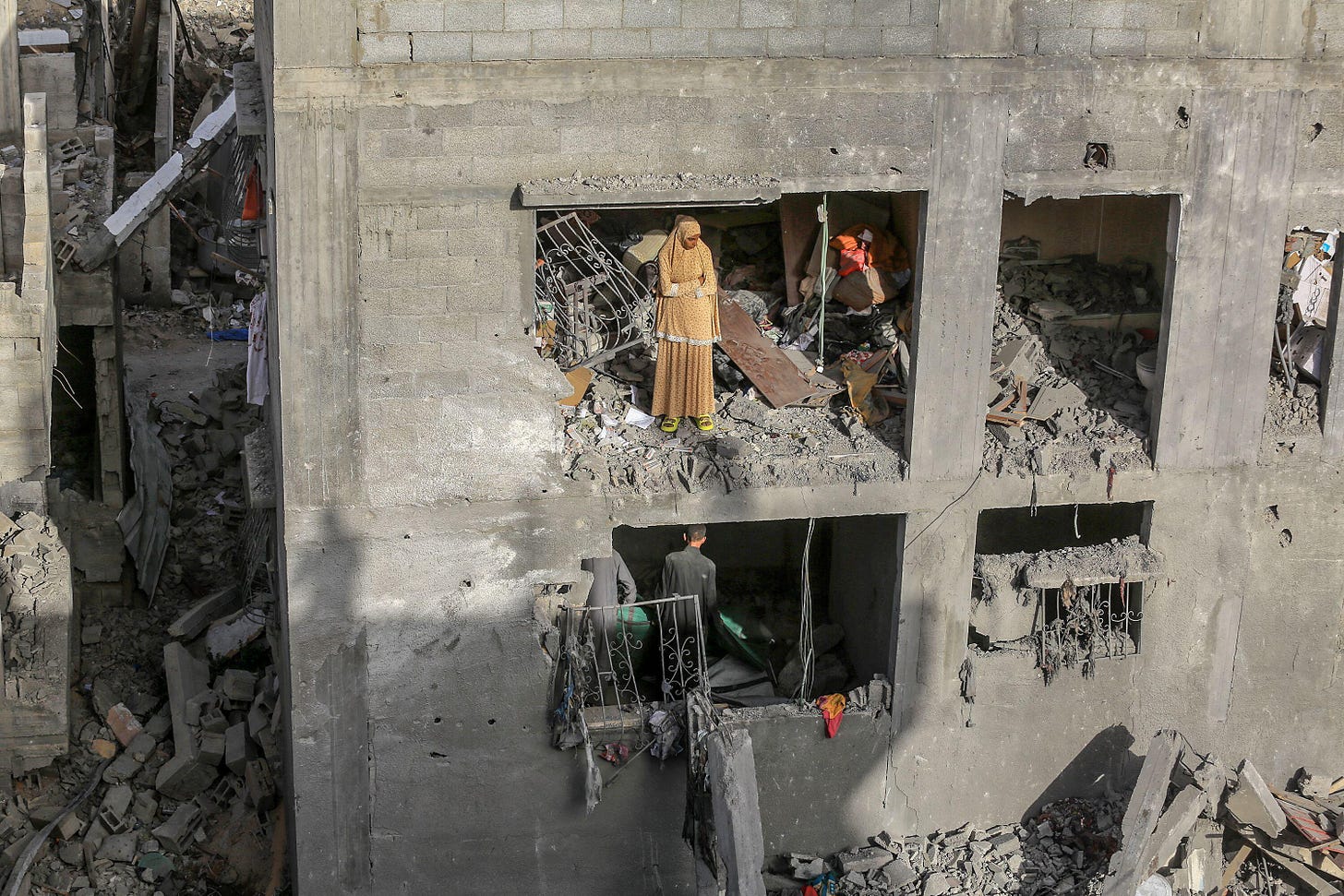

Israeli tanks are advancing into central Rafah today, following a night of deadly airstrikes across Gaza, after Israel´s defence minister announced a major expansion of its ground assault in the strip.
Outlining the plan, Israel Katz said that the objective was to seize “large areas” of the Palestinian enclave and incorporate them into what he described as “security” zones.
Hundreds of thousands of Palestinians who made their way back home to southern Gaza after the January ceasefire deal are now being ordered to leave in a mass evacuation.
In parallel to Israel´s military escalation, the US is increasing its forces in the region, with reports of dozens of American cargo flights in the Middle East over the past 48 hours.
An Israeli strike on a UN clinic sheltering displaced families in the northern town of Jabalia killed at least 19 Palestinians, including nine children, today, according to the nearby Indonesian hospital, and no food, water fuel or medicine has entered the strip since Israel imposed its total blockade 31 days ago.
In his statement today, Katz explicitly called on “the residents of Gaza to act now to eliminate Hamas and return the kidnapped”, without elaborating on how they were to do so.
Last week, hundreds of Palestinians held protests in northern Gaza in which, alongside venting their anger at Israel and the US, they also chanted against Hamas in a rare display of public dissent.
Under the original Israel-Hamas three-phase ceasefire agreement signed on 19 January, a three-phase proposal was drawn up. The first phase, completed on 1 March, led to the release of 33 Israeli hostages held in Gaza in exchange for 1,900 Palestinian prisoners held in Israel.
Under the second phase, Hamas was set to release all remaining living hostages in exchange for Israel releasing more Palestinian prisoners, making the ceasefire permanent and withdrawing all its forces from Gaza. But Netanyahu has refused to move forward with phase two of the original ceasefire, instead proposing a new US-backed offer: an extension of phase one under which more hostages would be freed but without any further commitment to ending the war. Hamas has refused to agree to this new proposal.
The likelihood of Netanyahu - whose own political career likely depends on achieving his goal of “total victory” over Hamas - going ahead with phase two of the ceasefire agreement was always highly uncertain.
As Tim Marshall wrote back in January, “one of Netanyahu´s hardline cabinet members resigned in protest over the original ceasefire deal and another was only persuaded to remain with assurances that the deal did not mean a permanent end to the war”. If Netanyahu had pressed ahead with phase two, and withdrawn all Israeli forces from Gaza, “additional cabinet resignations could see the government collapse followed by elections which Netanyahu could lose”.
The Israeli PM is, however, under renewed pressure from hostage families for his decision to return to military action instead of moving forward with phase two. The Hostage Familes’ Forum, which represents the relatives of those being held by Hamas, said families were “horrified to wake up this morning” to hear the defence minister’s statement of expanded military operations. “Has it been decided to sacrifice the hostages for the sake of ‘territorial gains’?” the group wrote in a statement.
Caitlin Allen
Deputy Editor
ON REACTION TODAY
Anthony Peters
If US tariffs do no good, neither will retaliatory ones
David Waywell
Will Donald Trump’s hair outlast the US Constitution?
ALSO KNOW
Musk to leave US government role soon - Donald Trump has reportedly told his inner circle that Elon Musk will step back from his current role as the head of the Department of Government Efficiency. This comes as a Democrat-backed judge Susan Crawford has defeated Brad Schimel, a candidate backed by Musk, to win a seat on the Wisconsin Supreme Court, now retaining a 4-3 liberal ideological majority. The Tesla and SpaceX owner spent millions on the former Republican attorney general and conservative judge.
Bosses warned about Heathrow outage days before - MPs were told in a Commons select committee today that Heathrow bosses were warned about the risk of power failure days before a fire at a substation, causing the airports power to shut down for 18 hours. The head of the Heathrow Airline Operators’ Committee, Nigel Wicking, said he had raised concerns on 15 March, after the lights on a runway went out briefly following “theft of wire and cable around some of the power supply.”
Liberation Day’ announcement looms - America’s biggest trading partners are waiting anxiously for what Donald Trump will announce this evening, when he unveils the details of his major new tarrifs, expected at 9pm UK time. Around 25,000 UK jobs are potentially at risk form car tariffs.
Russia claims gain in Ukraine - Russia says it has made a territorial advance in Donetsk. This comes as Vladimir Putin’s aide Kirill Dmitriev is expected to meet US special envoy Steve Witkoff in Washington, amid increasing US anger over stalling peace talks. Donald Trump also threatened imposing oil tariffs on Russia if negotiations were not taken seriously.
FIVE THINGS
The last thing we need is a UK-US trade war. Julian Jessop in CapX.
Europe’s wake-up call on defence. Nathalie Tocci in Prospect.
The stupidification of Scottish schools. Malcolm Clark in The Critic.
Is South Sudan’s fragile peace over? Nosmot Gbadamosi in Foreign Policy.
How memes spread conspiracy theories – and what to consider before sharing one. Emily Godwin in The Conversation.












